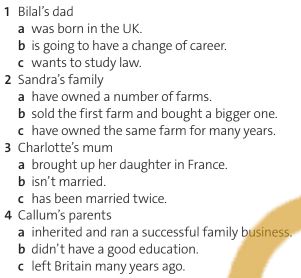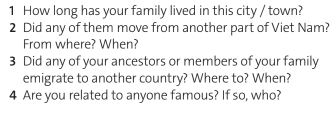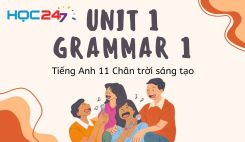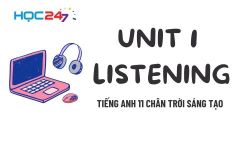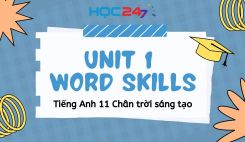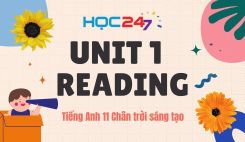Bài học Unit 1 - Vocabulary Tiếng Anh lớp 11 Chân trời sáng tạo giúp các em mở rộng vốn từ về các giai đoạn của cuộc đời con người. Bên cạnh đó, các em còn được ôn tập, củng cố kiến thức về Thì quá khứ đơn (Past Simple Tense). HOC247 mời các em cùng theo dõi nội dung chi tiết bài học bên dưới nhé!
1.1. Unit 1 lớp 11 Vocabulary Task 1
1.2. Unit 1 lớp 11 Vocabulary Task 2
1.3. Unit 1 lớp 11 Vocabulary Task 3
1.4. Unit 1 lớp 11 Vocabulary Task 4
1.5. Unit 1 lớp 11 Vocabulary Task 5
1.6. Unit 1 lớp 11 Vocabulary Task 6
1.7. Unit 1 lớp 11 Vocabulary Task 7
Tóm tắt bài
1.1. Unit 1 Lớp 11 Vocabulary Task 1
Work in pairs. Can you answer this famous riddle from Sophocles’s play Oedipus the King? Explain your answer.
(Làm việc theo cặp. Bạn có thể trả lời câu đố nổi tiếng này từ vở kịch Oedipus the King của Sophocles không? Giải thich câu trả lời của bạn.)
What creature walks on four legs in the morning, two legs in the afternoon, and three in the evening?
(Sinh vật nào đi bằng bốn chân vào buổi sáng, hai chân vào buổi chiều và ba chân vào buổi tối?)
Guide to answer
- The answer is a human. 4 legs in the morning is a baby crawling. 2 legs in the afternoon is an older child or adult that walks using its legs. 3 legs in the evening is an elderly person who uses a cane or walking stick to help them walk.
(Câu trả lời là một con người. Bốn chân vào buổi sáng là giai đoạn em bé biết bò. Hai chân về chiều là giai đoạn một đứa trẻ đang lớn hoặc người lớn biết đi bằng 2 chân. 3 chân vào buổi tối là giai đoạn người già phải chống gậy để đi lại.)
1.2. Unit 1 Lớp 11 Vocabulary Task 2
Number the stages of life in order that people reach them. Then listen and check.
(Đánh số các giai đoạn của cuộc đời theo thứ tự mà mọi người đạt được chúng. Sau đó nghe và kiểm tra.)
Guide to answer
1. be an infant: trẻ sơ sinh
2. be a toddler: trẻ mới biết đi
3. be a young child: một đứa trẻ
4. be in your teens: ở độ tuổi thiếu niên
5. be in your twenties: ở độ tuổi đôi mươi
6. be an adult: người lớn
7. be middle – aged: ở độ tuổi trung niên
8. be elderly: người già
9. be a centenarian: người sống trăm tuổi
1.3. Unit 1 Lớp 11 Vocabulary Task 3
Match some of the phrases in exercise 2 with the pictures below of the woman at different stages of her life.
(Nối một số cụm từ trong bài tập 2 với những bức tranh dưới đây về người phụ nữ ở các giai đoạn khác nhau trong cuộc đời của cô ấy.)
Guide to answer
- In picture A, she’s an infant.
(Trong hình A, cô ấy là một đứa trẻ sơ sinh.)
- In picture B, she’s a young child.
(Trong hình B, cô ấy là một đứa trẻ.)
- In picture C, she’s in her teens.
(Trong hình C, cô ấy đang ở tuổi thiếu niên.)
- In picture D, she’s in her twenties.
(Trong ảnh D, cô ấy ở độ tuổi đôi mươi.)
- In picture E, she’s an adult.
(Trong hình E, cô ấy là người lớn.)
- In picture F, she’s middle-aged.
(Trong ảnh F, cô ấy ở độ tuổi trung niên.)
- In picture G, she’s elderly.
(Trong hình G, cô ấy đã già.)
- In picture H, she's a centenarian.
(Trong hình H, cô ấy đã trăm tuổi.)
1.4. Unit 1 Lớp 11 Vocabulary Task 4
Check the meaning of the life events below. At what age are they most likely to happen, do you think? Put them in groups A – E. Compare your answers with your partner’s. Do you agree?
(Kiểm tra nghĩa của các sự kiện cuộc sống dưới đây. Theo bạn, chúng có nhiều khả năng xảy ra nhất ở độ tuổi nào? Xếp chúng vào nhóm A – E. So sánh câu trả lời của bạn với câu trả lời của bạn bạn. Bạn có đồng ý không?)
Life events
|
be born |
be brought up (by) |
become a grandparent |
|
buy a house or flat |
buy a house or flat |
get divorced |
|
get engaged |
get married |
get your first job |
|
go to university |
have a change of career |
inherit (money, a house, etc.) |
|
learn to drive |
leave home |
leave school |
|
pass away |
retire |
settle down |
|
split up |
start a business |
start school |
|
fall in love |
grow up |
move (house) |
|
start a family |
|
|
A. Before you are 20______________________________________________
B. From 20 to 40_________________________________________________
C. From 40 to 60_________________________________________________
D. Over 60______________________________________________________
E. At any age____________________________________________________
Guide to answer
A. Before you are 20: be born, be brought up (by), grow up, go to university, start a school.
(Trước khi bạn 20 tuổi: được sinh ra, được nuôi nấng (bởi), lớn lên, đi học đại học, bắt đầu đi học.)
B. From 20 to 40: buy a house or a flat, fall in love, get married, get engaged, get your first job, learn to drive, leave school, leave home, start a family, go to university.
(Từ 20 đến 40: mua nhà hoặc căn hộ, yêu, kết hôn, đính hôn, có công việc đầu tiên, học lái xe, nghỉ học, rời khỏi nhà, lập gia đình, vào đại học.)
C. From 40 to 60: get divorced, split up, have a change of career, start a business
(Từ 40 đến 60 tuổi: ly hôn, chia tay, thay đổi nghề nghiệp, lập nghiệp)
D. Over 60: retire, pass away, settle down, become a grandparent.
(Trên 60 tuổi: nghỉ hưu, qua đời, an cư lạc nghiệp, lên chức ông bà.)
E. At any age: move house, inherit (money, a house, etc.), emigrate.
(Ở mọi lứa tuổi: chuyển nhà, thừa kế (tiền, nhà, v.v.), di cư.)
1.5. Unit 1 Lớp 11 Vocabulary Task 5
Listen to four people talking about their backgrounds and their families. Circle the correct answers (a-c)
(Hãy nghe bốn người nói về xuất thân và gia đình của họ. Khoanh tròn các câu trả lời đúng (a-c).)
Guide to answer
Đang cập nhật
1.6. Unit 1 Lớp 11 Vocabulary Task 6
Complete the sentences with the past simple form of the verbs below. Then listen again and check.
(Hoàn thành các câu với dạng quá khứ đơn của các động từ dưới đây. Sau đó nghe lại và kiểm tra
|
be |
buy |
emigrate |
|
fall |
get |
get |
|
start |
grow up |
leave |
|
move |
not go |
not leave |
|
not retire |
|
|
1. My grandparents______________from Pakistan in the 1960s.
2. She______________home until last summer, when she______________married.
3. I ______________In the village where my family has lived for generations.
4. They managed to save quite a bit of money and eventually______________a small farmhouse with some land.
5. They ______________in love, ______________engaged after a week and were married a month later.
6. I ______________brought up by my mom after she______________back to the UK.
7. They ______________school at 16 and ______________to university.
8. They ______________a successful business and______________until they were in their seventies.
Guide to answer
|
1. emigrated |
2. didn’t leave - got |
|
3. grew up |
4. bought |
|
5. fell - got |
6. was - moved |
|
7. left – didn’t go |
8. started – didn’t retire |
1. My grandparents emigrated from Pakistan in the 1960s.
(Ông bà tôi di cư từ Pakistan vào những năm 1960.)
2. She didn’t leave home until last summer, when she got married.
(Cô ấy đã không rời khỏi nhà cho đến mùa hè năm ngoái, khi cô ấy kết hôn.)
3. I grew up in the village where my family has lived for generations.
(Tôi lớn lên ở ngôi làng nơi gia đình tôi đã sống qua nhiều thế hệ.)
4. They managed to save quite a bit of money and eventually bought a small farmhouse with some land.
(Họ đã dành dụm được kha khá tiền và cuối cùng mua một trang trại nhỏ với một ít đất.)
5. They fell in love, got engaged after a week and were married a month later.
(Họ yêu nhau, đính hôn sau một tuần và họ cưới nhau một tháng sau đó.)
6. I was brought up by my mom after she moved back to the UK.
(Tôi được mẹ nuôi dưỡng sau khi bà ấy chuyển về Vương quốc Anh.)
7. They left school at 16 and didn’t go to university.
(Họ rời trường năm 16 tuổi và không học đại học.)
8. They started a successful business and didn’t retire until they were in their seventies.
(Họ bắt đầu kinh doanh thành công và không nghỉ hưu cho đến khi họ 70 tuổi.)
1.7. Unit 1 Lớp 11 Vocabulary Task 7
Work in pairs. Ask and answer about your family and your ancestors. Give extra information where you can.
(Làm việc theo cặp. Hỏi và trả lời về gia đình và tổ tiên của bạn. Cung cấp thêm thông tin nơi bạn có thể.)
Guide to answer
A: How long has your family lived in this city?
B: My family has been in Ho Chi Minh City for about fifty years. My parents and I were born here. Therefore, this is also my hometown.
A: Did any of them move from another part of Vietnam? From where? When?
B: I remembered my dad used to told me that in 1930, my grandfather move from Dalat City to HCM City to work and start a family with my grandmother. Because he loved the beauty here, he decided to settle down in Sai Gon forever.
A: Did any of your ancestors or members of your family emigrate to another country? Where to? When?
B: Well, my family doesn't have anyone that emigrates to another country and we don't have any intention to do so because we love the peace and the pace of life in HCM City.
A: Are you related to anyone famous? If so, who?
B: Well, I’m not related to anyone famous.
Tạm dịch:
A: Gia đình bạn sống ở thành phố này được bao lâu rồi?
B: Gia đình tôi đã ở thành phố Hồ Chí Minh khoảng năm mươi năm. Cha mẹ tôi và tôi được sinh ra ở đây. Vì vậy, đây cũng là quê hương của tôi.
A: Có ai trong số họ chuyển đến từ một vùng khác của Việt Nam không? Từ đâu? Khi nào?
B: Tôi nhớ bố tôi từng kể với tôi rằng vào năm 1930, ông tôi từ Đà Lạt vào thành phố Hồ Chí Minh làm việc và lập gia đình với bà tôi. Vì yêu cảnh đẹp nơi đây nên ông quyết định vào Sài Gòn an cư lạc nghiệp mãi mãi.
A: Có bất kỳ tổ tiên hoặc thành viên nào trong gia đình bạn di cư đến một quốc gia khác không? Đến đâu? Khi nào?
B: À, gia đình tôi không có ai di cư sang nước khác và chúng tôi cũng không có ý định làm như vậy vì chúng tôi yêu sự yên bình và nhịp sống ở thành phố Hồ Chí Minh.
A: Bạn có họ hàng với ai nổi tiếng không? Nếu có thì đó là ai?
B: Ồ! Thật ra tôi không liên quan đến ai nổi tiếng cả.
Bài tập minh họa
Read the passage and then do the exercises that follow.
Life on earth depends on the sun. Day after day we see its light and feel its warmth, but we do not often consider its origin. Yet there are many remarkable things about the sun. One is its distance from the earth. This is about ninety-three million miles. A journey of this distance, even if it could be made, would take several hundred years even in the fastest rocket.
The sun is a large star. The planet earth is very small in comparison. One hundred and nine globes the size of the earth would be needed to stretch from one side of the sun to the other. The sun makes us feel hot, even at a distance of ninety-three million miles. This is not surprising. The temperature on the sun is about ten thousand degrees Fahrenheit. But we receive only a small part of this heat. The total heat of the sun could melt a column of ice two and a quarter miles thick and ninety-three million miles high in one second.
The brightness of the sun is equally astonishing. The sun gives such a bright light that 1,575,000,000,000,000,000,000 (one thousand five hundred and seventy five billions and billions) of wax candles would be needed to give an equal light. This very long row of figures gives us some idea of the brilliance of the sun. As we said earlier, we receive only a very small part of the sun’s heat. We also receive only a very small part of its light. This is sufficient for the growth of trees and plants, and for the existence of living creatures on earth. Too much heat and light would destroy the balance of life. The heat and light from the sun come in just the right quantities for life on earth.
Decide whether the following statements are true (T) or false (F).
1. The sun is the largest of the planets.
2. The distance from the earth to the sun is too great for us to travel there.
3. The sun’s light comes from many billions of wax candles.
4. Most of the sun’s heat and light are received on earth.
5. Without the correct balance of heat and light, life on earth would not be possible.
Key (Đáp án)
1. F
2. T
3. F
4. F
5. T
Luyện tập
3.1. Kết luận
Qua bài học này các em cần ghi nhớ các nội dung chính sau:
Vocabulary (Từ vựng)
- riddle (n) câu đố
- adult (a) người trưởng thành
- centenarian (n) người sống trên 100 tuổi
- infant (n) trẻ sơ sinh
- toddler (n) trẻ mới biết đi
- middle – aged (a) trung niên
- brought up (v) nuôi dưỡng
- emigrate (v) di cư
- fall in love (idiom) phải lòng ai đó
- divorce (n) li dị
- engage (v) đính hôn
- grow up (v) lớn lên
- inherit (v) thừa kế
- pass away (v) qua đời
- retire (v) nghỉ hưu
- settle down (v) ổn định
- slipt up (v) chia tay
- ancestor (n) tổ tiên
- generation (n) thế hệ
- farmhouse (n) trang trại
Grammar (Ngữ pháp)
*Công thức thì Quá Khứ Đơn (Simple Past Tense)
+ Khẳng định của động từ thường: S + V2/ed.
+ Khẳng định của động từ tobe: S + was/were.
+ Phủ định của động từ thường: S + didn’t Vo.
+ Phủ định của động từ tobe: S + was/were + not.
3.2. Bài tập trắc nghiệm Unit 1 - Vocabulary
Như vậy là các em đã xem qua bài giảng phần Unit 1 - Vocabulary chương trình Tiếng Anh lớp 11 Chân trời sáng tạo. Để củng cố kiến thức bài học mời các em tham gia bài tập trắc nghiệm Trắc nghiệm Unit 1 lớp 11 Chân trời sáng tạo Vocabulary - Từ vựng.
Câu 4-10: Mời các em đăng nhập xem tiếp nội dung và thi thử Online để củng cố kiến thức về bài học này nhé!
Hỏi đáp Unit 1 - Vocabulary Tiếng Anh 11
Trong quá trình học tập nếu có thắc mắc hay cần trợ giúp gì thì các em hãy comment ở mục Hỏi đáp, Cộng đồng Tiếng Anh HOC247 sẽ hỗ trợ cho các em một cách nhanh chóng!
Chúc các em học tập tốt và luôn đạt thành tích cao trong học tập!
-- Mod Tiếng Anh 11 HỌC247







